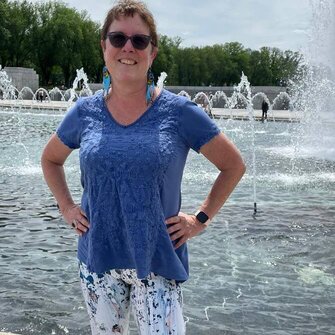
“Bonjour,” I said as I marched into the communications office in American University of Beirut’s business school. “I am looking for Ms. C.H.”
“Yes, sure. She’s right over there,” replied an officer.
I walked towards Ms. C.H. confidently, holding several sheets of paper. I introduced myself: “Batoul Bilalli. We spoke on the phone earlier today.”
“Hello, how are you doing?” she replied amiably. “Are your papers ready?”
“Yes, they’re right here,” I said, as I handed her the papers.
“Your papers check out. You need to fix this part though,” Ms. C.H. said, going through the papers. “Oh! You are Palestinian? AUB only hires Lebanese citizens. I am sorry, but you cannot work with us.”
Pause. I take this in. I remembered to smile.
“But I was accepted and I am supposed to start as a research assistant in few days,” I said. “Isn’t there something that can be done?”
“I am terribly sorry, but no. There’s nothing that can be done. This is AUB policy,” she replied with a sincere voice.
I stuttered a thank you, then dashed out of the office in search of a place to hide.
When dreams are dead on arrival
My name is Batoul Bilalli and I am an AUB graduate with a degree in business administration. When I was a high school student, I always imagined myself as a doctor. The dream haunted me for as long as I can remember. Then one day, I learned the ugly truth. My parents laid it out plain and simple for me: “Batoul, you cannot be admitted into the syndicate [similar to a union] as a Palestinian. As a physician, you would have to either work illegally or in a Palestinian refugee camp. Your 13 years of study would not be rewarded.”
I could have tried to study abroad (although it is not easy for Palestinian refugees to get visas), but like many parents, mine wanted me to stay close by. In despair, I wrote “business administration” on my university application.
“I will have a variety of work options this way,” I reassured myself. “I can open my own business at some point. Besides, managers are the ones in control and every other professional works beneath them.”
AUB is one of the elite universities in the Middle East, and I received a scholarship from an organization that supports Palestinians. But now, after three years, I find myself lost. I still have big dreams of being a successful person, but with no clear path of how to get there. I blame myself for spending too much time thinking about how I could have been studying medicine.
The curse of the 'blue ID'
Unfortunately, this is one of many similar stories in Lebanon. Palestinians face a hard time finding jobs. We carry a “blue ID,” and once we show it to a potential employer, the situation shifts no matter how good a candidate we may be. Even though we have lived in Lebanon ever since the Nakba (expulsion after the creation of Israel), the label “Palestinian refugee in Lebanon” still lingers like a stigma (this phrase is written on our IDs).

Lebanon has been involved in several wars over its land, resulting in many social problems, including increasing unemployment. In response, the Lebanese government prohibits employment of Palestinians in more than 20 professions, including medicine and engineering. Syrian refugees now are being treated the same. In a report by the UNHCR about the situation of Palestinian refugees in Lebanon, 56 percent of Palestinian refugees in Lebanon are unemployed. We also are prevented from legally acquiring, transferring or inheriting property, accessing Lebanese public healthcare services and (and a few exceptions) enrolling in Lebanese public schools.
There are no formal laws that govern the relationship of the Lebanese government with Palestinian refugees, so we are in a gray zone legally and socially. Instead, we are classified the same as “foreigners.” Foreigners are allowed to work in Lebanon only if they obtain approval from the Ministry of Labor and Social Affairs. Although that may seem fair, in actual practice the barriers are many, especially for Palestinians. Professionals in Lebanon must belong to the relevant syndicate; however, only those who have been “Lebanese for over 10 years” are allowed to register, thus making it illegal for non-citizens to pursue a career in Lebanon. (The only way to obtain Lebanese nationality is if a female non-citizen marries a Lebanese.) This has caused a large number of institutions to exclude Palestinian employees. Others allow us to work without a permit, but with no legal protection and employee rights, we do not receive equal pay or severance compensation upon the termination of service.
This substandard treatment of Palestinian workers must end. Our plight has been ignored and delayed long enough. We deserve to be able to work legally and for our rights to be protected. We are different from other foreign citizens residing in Lebanon. By all definitions, this is our country too.











